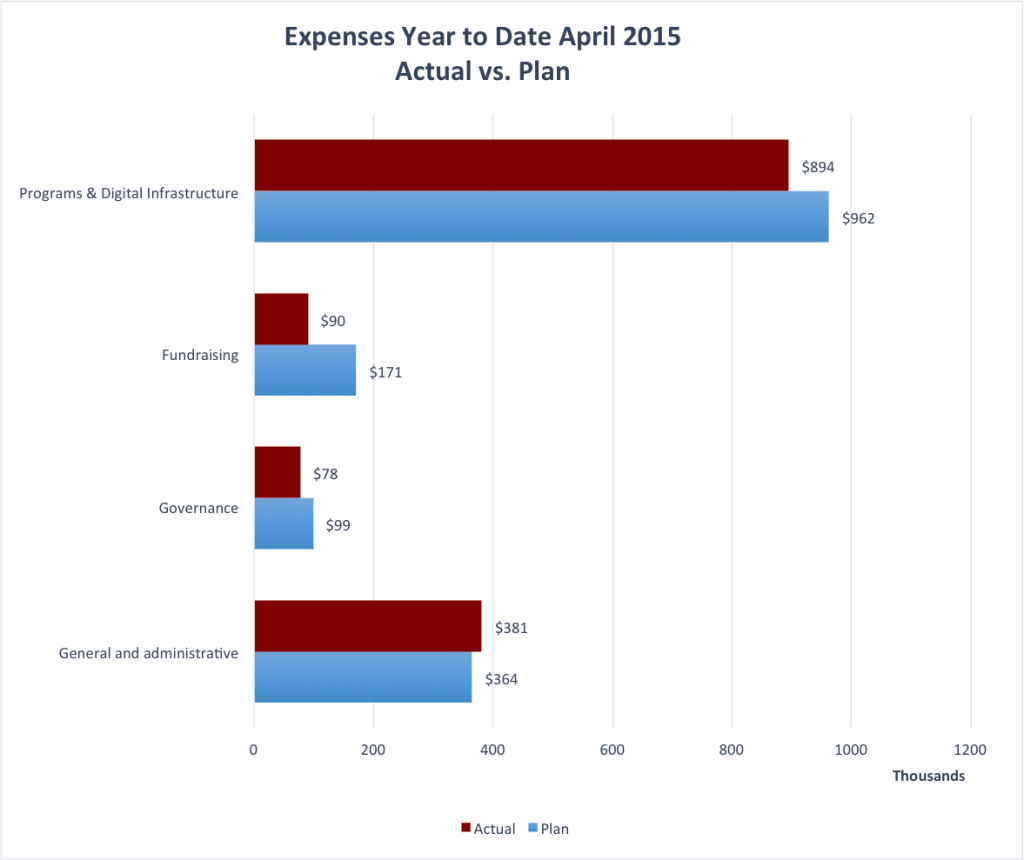Highlights
- During a one-day meeting in Houston, Director of Finance and Administration Bill Gong, Director of Programs LiAnna Davis, and Executive Director Frank Schulenburg met with Wiki Ed’s board of directors to discuss Wiki Ed’s strategic options, as part of our ongoing strategic planning process.
- We saw a significant increase in the percentage of students completing our online training prior to editing Wikipedia. In fall 2014, 28% of students completed the training. This term, we achieved a completion rate of 52%. We think students taking the training is critical to their success as content contributors on Wikipedia, and we’re assuming that the visibility of training completion rates on our new Dashboard contributed to this huge increase.
- Educational Partnerships Manager Jami Mathewson and Communications Associate Eryk Salvaggio attended the Midwest Political Science Association’s annual conference to kick off MPSA’s Wikipedia initiative, which aims to improve publicly available political science information through Wikipedia. MPSA is encouraging its members to actively participate in curating knowledge on Wikipedia as a community service.
- UC Berkeley students visited water resource locations as part of the student outreach pilot lead by Outreach Manager Samantha Erickson. As a result, the students added photos to Wikipedia and improved a number of articles by expanding them.
Programs
Educational Partnerships
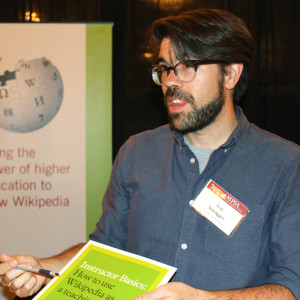
- Jami and Eryk hosted a seminar and information booth among the 5,500 people attending the Midwestern Political Science Association’s conference in Chicago. The event marked the start of the MPSA partnership and Wikipedia initiative dedicated to improving political science topics on Wikipedia.
- Jami met with the executive directors of the Association of College & Research Libraries and the Association for Library Collections & Technical Services to discuss opportunities for university libraries to improve Wikipedia. We came to a deeper appreciation of library needs, including the difficulties many libraries face with informing the public about special collections and archives. The power to direct attention to these archives was a tremendous incentive for working with Wikipedia.
- Jami and Eryk presented strategies for bringing Wikipedia into classrooms at Northwestern University, alongside Dr. Aaron Shaw. Dr. Shaw provided an overview of his own course structure while Jami and Eryk shared more general information to a diverse array of faculty members. The Searle Center for Advancing Learning & Teaching organized and hosted the event.
- Jami and Eryk met with the University of San Francisco’s Faculty Learning Community to discuss information literacy for first-year students. The FLC was passionate and knowledgeable on the topic of improving information literacy. Ideas for Wikipedia’s place in that mission came from librarians and faculty across a spectrum of departments, inquiring about the kinds of support we could provide for libraries and classrooms. The conversation also touched on possibilities for the student outreach pilot.
- In a webinar, LiAnna presented Wikipedia as a teaching tool to several hundred people online. The talk was part of iThenticate’s Plagiarism Education Week. (iThenticate is the company behind the Turnitin software, which checks student work for plagiarism.)
Classroom Program
Status of the Classroom Program for Spring term 2015 in numbers, as of April 30:
- 117 Wiki Ed-supported courses had Course Pages
- 55, or 47%, were led by returning instructors
- 2,144 student editors were enrolled
- 1,115 students successfully completed the online training
Wiki Ed is supporting 117 courses as of April 30. Students are busy editing as many courses are near the end of the spring term, but we’re also beginning to welcome new summer term classes.
The number of students who have completed the online training (1,115) is the highest we’ve ever seen. The percentage of students who have completed the training (52%) is a significant increase compared to previous terms (spring 2014: 25%, fall 2014: 28%). We tie this success to our Dashboard (dashboard.wikiedu.org), which allows instructors to track their students’ completion of the training. We rolled out the Dashboard near the beginning of the term and have made it easily accessible on mobile devices since.
We’ve also noticed that students this semester have been taking more care with their contributions, perhaps partly due to training and partly due to the structure the Assignment Design Wizard has built into more assignments. For example, more students are working in sandboxes and talk pages before editing articles this term. Wiki Ed Content Experts Adam Hyland and Ian Ramjohn, in addition to working with students to provide feedback on their contributions, have also been busy identifying good content from completed courses that has not yet been moved from sandboxes into the main article space.
Student work highlights
- Multicoloured tanager: Students in Sabrina Taylor’s Conservation Biology course at Louisiana State University took this stub article and added a photograph, along with information about the tanager’s habitat, feeding, breeding, and conservation status.
- Holmes tremor: Students in Michelle Mynlieff’s Neurobiology course at Marquette University took this stub article and added information about symptoms, treatment, and diagnosis, all supported by the addition of recent, high-quality sources.
- Sentimental comedy: New article created by students in Amy Hughes’s course on Theater History from 1642 at CUNY, Brooklyn College
- Fracture zone: Students in Melissa Driskell’s Geotectonics course at the University of North Alabama improved this article by adding illustrations, alongside five descriptive examples of fracture zones supported by eight new sources.
- Connexon: This stub article in biochemistry was improved by students in Michelle Mynlieff’s Neurobiology course at Marquette University
- Well-made play: Improved by students in Amy Hughes’s course on Theater History from 1642 at CUNY, Brooklyn College. It’s now 11 paragraphs in 11 sections, supported by six recent sources.
- Inlet ionization: Students in Kermit Murray’s Mass Spectrometry course at Louisiana State University created this article from scratch. It includes four illustrations and 11 sources.
- Atlantic blue crab: Students in Sabrina Taylor’s Conservation Biology course at Louisiana State University added 15 sources to this article, dramatically expanding the section on the commercial importance of the crab. The students also added a table showing the value and comparing the value of commercial crab industries across states.
- Housing segregation in the United States: Students in Anne Chao’s course on Human Development in Global and Local Communities at Rice University re-organized this article and added six examples of legislation related to housing segregation in the US. Students also added information about causes, trends, and effects of housing segregation.
- Zapata (lithograph): Students in Stacie Widdifield’s Topics in Art History course at the University of Arizona created this article about Diego Rivera’s lithograph. It includes images, and a list of collections where you can view prints of the lithograph.
Communications
A new version of our Case Studies brochure will be ready in May after final touches were applied in April. The brochure, intended to spark ideas and conversations with instructors, expands on our previous Case Studies booklet with new ideas for using Wikipedia in classrooms. Final design changes have also been applied to discipline-specific handouts on Editing Wikipedia articles on Women’s Studies and Editing Wikipedia articles on Ecology.
Eryk and Interim Classroom Program Manager Ryan McGrady began planning a knowledge production brochure, which will tackle Wikipedia as a model for illustrating academic and theoretical concepts. We expect to have it printed by June.
Blog posts:
- Wiki Ed presents at University Libraries (April 23)
- Monthly Report for March 2015 (April 22)
- The Roundup: Theater History (April 13)
- Be Boulder: Geology Club edits Wikipedia (April 10)
- Catching the Wiki bug (April 8)
- Notes and slides from Quarterly Reviews now available (April 7)
- The Roundup: Alien Territory (April 6)
Digital Infrastructure
This month, Product Manager Sage Ross and the development team at WINTR have been busy developing the upcoming wikiedu.org course platform. You can now log in to dashboard.wikiedu.org using your Wikipedia account, and if you’re participating in any of our courses, you’ll see those courses at the top of the list. For instructors, logging in also lets you post reminders to all of your students who haven’t completed the student training.
Most of the work remains behind-the-scenes, and you can now follow our progress on GitHub and on Phabricator, the Wikimedia community’s tool for tracking technical issues and development plans. Design plans for the new course pages and integrated Assignment Design Wizard are beginning to crystallize — see the latest course creation user flow and design styles for course page elements — while a functional skeleton for creating and modifying course timelines is quickly taking shape. Sage also took time in April to improve our setup for testing new code and monitoring the performance and reliability of the dashboard.
Research and development
Outreach to high-achieving students
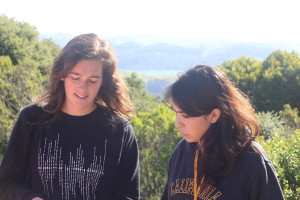
UC Berkeley students led a field trip to California water resource locations in the Sacramento, San Joaquin, and Berkeley areas as part of the student outreach pilot. The trip was led by the Berkeley Water Group Idea Lab, and joined by a UC Berkeley course, ER:190 California Water.
Samantha also worked to onboard a new student chapter at Portland State University, the Lambda Pi Eta undergraduate honor society of the National Communication Association. She will travel to Oregon in May to lead student learning workshops for Portland State’s Lambda Pi Eta, the Oregon State University Hydrophiles, and Oregon State University Pi Alpha Xi, three groups participating in the pilot program. She also worked to prepare for a workshop at University of California Santa Barbara’s Art, Design & Architecture Museum Club in early May.
Finance & Administration / Fundraising
Finance & Administration
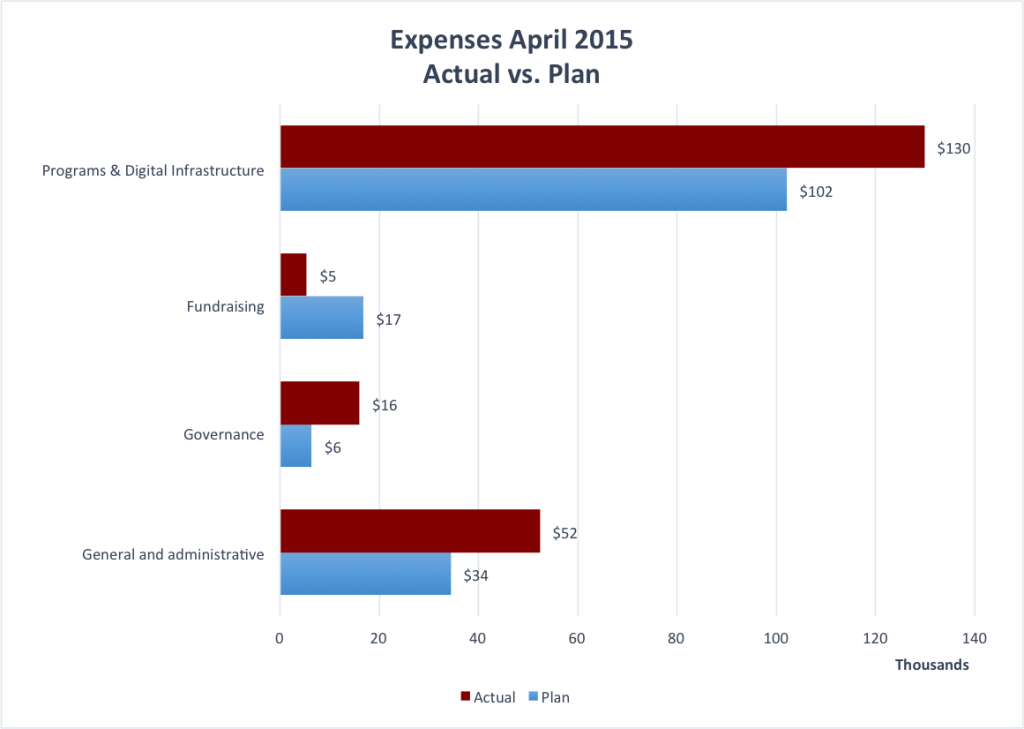 For the month of April, expenses were $203,560 versus the plan of $159,681. The majority of the $44k excess in spending is on account of securing additional funds for new digital infrastructure projects.
For the month of April, expenses were $203,560 versus the plan of $159,681. The majority of the $44k excess in spending is on account of securing additional funds for new digital infrastructure projects.
- Year-To-Date expenses are $1,443,899 versus the plan of $1,596,262. The ongoing savings from the timing of staff hires and vacancies ($100k) and the deferral of special events ($67k) (fundraising and workshops) create the majority of the $152k year-to-date variance.
Office of the ED
- Current Priorities:
- Preparing the annual plan and budget
- Next steps in the strategic planning process: documenting our findings and outlining our strategy for the upcoming two years
- Planning the programmatic work for next fiscal year according to the strategic priorities set by the board
-
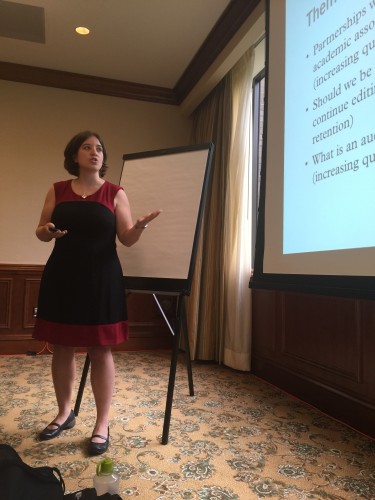
LiAnna presenting at Wiki Ed’s strategic planning meeting in Houston. In April, we concluded the next step in our strategic planning process. Board and senior staff met in Houston to create alignment around our strategic priorities for the upcoming two years. During a one day meeting, Bill, LiAnna, and Frank presented strategic alternatives to Wiki Ed’s board of directors. As part of this collaborative process, participants of the meeting discussed the following leading questions: What are the potential strategic directions for our programmatic work through 2017? What does the organization look like that we want to create?
- Also in April, Frank finalized the hiring for our open Senior Manager of Development position. Tom Porter will join Wiki Ed on May 13. He has a track record of securing funds for the Yellowstone Park Foundation and SFJazz and will work closely with Frank and Wiki Ed’s program staff to ensure that current and future programs are sufficiently resourced.
Visitors and guests
- Karen Twitchell, board member
- David Peters, Exbrook
- Floor Koudijs, Wikimedia Foundation
- Anna Koval, Wikimedia Foundation
- Amin Azzam, University of California San Francisco
- David Bresler, Tufts University
- Katie McFadden, Swift River Consulting
